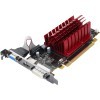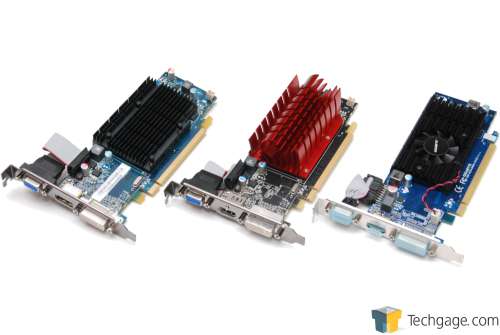- Qualcomm Launches Snapdragon 4 Gen 2 Mobile Platform
- AMD Launches Ryzen PRO 7000 Series Mobile & Desktop Platform
- Intel Launches Sleek Single-Slot Arc Pro A60 Workstation Graphics Card
- NVIDIA Announces Latest Ada Lovelace Additions: GeForce RTX 4060 Ti & RTX 4060
- Maxon Redshift With AMD Radeon GPU Rendering Support Now Available
ATI’s Radeon HD 5450 – The Perfect HTPC Card?

This past fall, AMD launched its latest graphics generation with the high-end HD 5870, and today, it looks to the opposite end of the spectrum with its $50 HD 5450. Though inexpensive, the HD 5450 has a surprising amount of spunk. Coupled with its passive design and full media capabilities, it looks to be the ideal solution for your HTPC.
Page 10 – Final Thoughts
With our look at NVIDIA’s three lowest-end cards just two weeks ago, and our look at the HD 5450 today, and not to mention our upcoming look at the HD 5570, I can’t help but feel like I’ve stepped into some sort of low-end dimension. There is nothing wrong with budget cards, per se, but one thing’s for certain… I can’t wait for Fermi to get here so I can be greeted back to high-end resolutions!
AMD set out to defeat NVIDIA’s GeForce 210 with its HD 5450, and there’s no question at all that it has the superior card. The HD 5450 was more power efficient, ran cooler (even with its passive heatsink), delivered upwards of a 50% performance boost in most titles, and supports things we’ve come to like about the HD 5000 series, such as Eyefinity and DirectX 11. That’s right… if you wanted, you could power up to three separate displays with just one $50 HD 5450 (adapters would be required).
From a performance standpoint, the HD 5450 is easily the better card when comparing to the GeForce 210, as all of our tests have confirmed. This is something we expected, since NVIDIA’s card is based on aging technology. The tables may very-well turn once Fermi based budget cards get here, but those are a long way off. For now, AMD will dominate the market for $50 graphics cards.
Do note though, that while NVIDIA’s 210 retails for around $45, mail-in rebates are abound to bring the prices down by $20 in some cases. If gaming performance isn’t at all important, nor temps or other HD 5000 perks, that deal may be more appealing to you. You will not find as many passive designs on the 210, however.
One thing we didn’t touch up on was HD playback, but that’s one thing AMD touts as excelling on its entire range of HD 5000 cards, and especially the HD 5450. The card features all of the goodies you’ve come to expect, such as support for dual decode, Dolby TrueHD and all the others. Where HD content is concerned, the HD 5450 simply isn’t lacking. It’s a very feature-rich card in a very small package.
The three models we took a look at today aren’t all too different from one another, but I’m so pleased with the overall model that I’m awarding them each an Editor’s Choice award. Each version has its perks, with Gigabyte’s being my favorite simply because it has the smallest cooler and is still incredibly quiet. Sapphire’s card is also really good, and shaves a few extra degrees off the temperature thanks to its slightly larger cooler. The best for cooling would be AMD’s reference, but I have a gut feeling no vendor is going to adopt it. I’m hoping I’m wrong.
Is the HD 5450 the best HTPC card ever produced? For $50 and all it offers, you be the judge. It’s sure not a gaming card by any stretch, but it does allow light gaming, and comes in an extremely small package. Please note that while not pictured, both Gigabyte’s and Sapphire’s card includes multiple low-profile replacement brackets if you don’t have the need to use VGA and are using a very, very small chassis.

ATI (AMD, Gigabyte & Sapphire) Radeon HD 5450
Discuss this article in our forums!
Have a comment you wish to make on this article? Recommendations? Criticism? Feel free to head over to our related thread and put your words to our virtual paper! There is no requirement to register in order to respond to these threads, but it sure doesn’t hurt!
Support our efforts! With ad revenue at an all-time low for written websites, we're relying more than ever on reader support to help us continue putting so much effort into this type of content. You can support us by becoming a Patron, or by using our Amazon shopping affiliate links listed through our articles. Thanks for your support!






